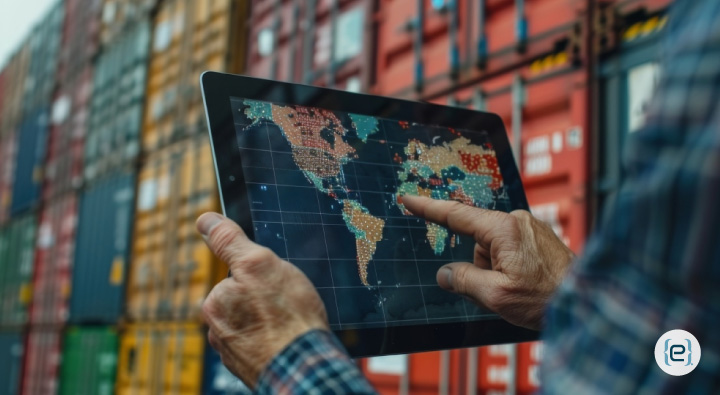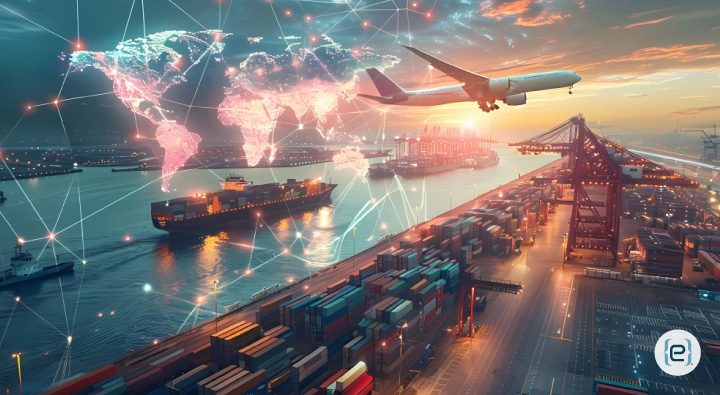Friday afternoon at Pacific Trade Partners. Your container tracking system just went dark, leaving twenty million dollars’ worth of goods floating somewhere between Shanghai and Los Angeles. Meanwhile, your customs documentation platform crashes, threatening to rack up detention charges that could sink your quarterly profits. Across town, your competitor smoothly manages hundreds of shipments across multiple continents. The difference? One tried to handle global logistics with outdated systems. The other partnered with IT experts who understand international trade.
The Customs Catastrophe: When IT Fails, Goods Rot
Last week, I watched a mid-sized importer lose two million in perishable goods because their documentation system failed during a critical customs clearance. Their paperwork was trapped in digital limbo while their products sat rotting in port. In global trade, delays don’t just cost money—they destroy inventory and relationships.
The Digital Dock Crisis: Outdated Systems, Modern Problems
Here’s my controversial perspective that might ruffle some logistics managers’ feathers: most import-export companies are running global operations on infrastructure better suited for a local delivery service. Sure, you might have tracking numbers and shipping software, but your underlying systems? Often more fragile than a container full of crystal wine glasses.
The Documentation Dance: Compliance on a Tightrope
Try watching a trading company manage compliance documentation without proper infrastructure. It’s like trying to juggle flaming torches while riding a unicycle on a cargo ship. I’ve seen firms lose major contracts because their documentation processing couldn’t keep pace with modern trade requirements. Modern trade demands robust, integrated IT solutions that can handle compliance at speed and scale. If you’re still cobbling together spreadsheets and PDFs, you’re a step away from disaster.
The Supply Chain Symphony: Orchestrating Global Success
Modern trade requires orchestrating dozens of moving parts—suppliers, carriers, customs brokers, warehouses, buyers. I’ve seen companies try to coordinate this complex dance using systems that barely talk to each other. Success in international trade isn’t just about moving goods—it’s about moving information.
- Real-time visibility: Without a unified platform, you’re always a step behind your competition.
- Integrated workflows: Disconnected systems mean missed deadlines and lost profits.
For a deeper dive on how to build an IT strategy that supports complex logistics, check out these IT strategies for retail.
The Compliance Tangle: Navigating International Waters
Remember when international trade just meant buying and selling? Now it’s about navigating complex regulatory requirements across multiple jurisdictions. Without proper IT infrastructure, it’s like trying to sail through a hurricane with a paper map and a broken compass. You need systems that adapt to new regulations and automate compliance tasks, not ones that leave you exposed to fines and delays.
The Currency Chaos: Managing Financial Risk
Trading across borders means dealing with multiple currencies, exchange rates, and financial regulations. One company I know lost thousands on a single shipment because their foreign exchange monitoring system couldn’t keep up with market fluctuations. Their competitor? Manages currency risks automatically through integrated systems. For more on how digital solutions can help you manage and automate these processes, explore our QBO Advanced services.

The Real-Time Reality: Always On, Never Behind
Global trade happens 24/7 across every time zone. Trying to manage this without proper IT infrastructure is like trying to conduct an orchestra while blindfolded. One trading house finally saw their true operational efficiency for the first time after implementing proper tracking and monitoring systems.
The Partner Puzzle: Connecting the Dots
Here’s something wild: a single international shipment might involve dozens of different partners, each with their own systems and requirements. Getting all these pieces to work together without proper infrastructure? That’s about as easy as teaching a cargo ship to dance ballet. With eMazzanti, you can ensure seamless integration across all your partners and platforms.
- Unified communications: Reduce errors and delays.
- Automated data exchange: Keep everyone on the same page.
The Market Mayhem: Seizing Opportunities with Data
International markets change faster than ocean weather. I watched one company miss major opportunities because their market intelligence systems couldn’t process information fast enough. Meanwhile, their competition seized opportunities thanks to real-time data analysis and automated decision support. If you want to stay ahead, consider how managed services can transform your business.
The Insurance Integration: Streamlining Risk Management
Modern trade requires seamless integration with insurance providers, financial institutions, and risk management systems. One company spent months manually reconciling insurance claims because their systems couldn’t communicate properly. Their competitor? Handles claims automatically through integrated platforms.
The Expert Edge: Why You Need a Technology Partner
This is where professional IT partners become invaluable. Recently, I watched eMazzanti Technologies transform a struggling import-export operation’s entire technological backbone. We didn’t just fix technical problems—we prevented them from happening. Our proactive approach means systems stay up, data stays secure, and you can focus on trade instead of fighting technology. Learn more about our 24/7 IT support and how we keep your business running smoothly.
The Strategic Shift: Technology as Your Competitive Advantage
After years of watching trading companies evolve, one truth stands out: trying to handle modern international trade IT needs internally is like trying to navigate an ocean with a compass made of wishful thinking. Possible? Maybe. Smart? Definitely not.
- Proactive IT management: Prevent problems before they impact operations.
- Continuous innovation: Stay ahead of the curve with expert guidance.
The most successful trading companies understand that technology infrastructure isn’t just overhead—it’s a competitive advantage. They partner with IT experts who understand global trade’s unique challenges, stay ahead of technology trends, and provide the kind of proactive support that prevents problems before they impact operations.
The Bottom Line: Your IT, Your Global Success
In today’s trading landscape, your IT infrastructure isn’t just about keeping computers running—it’s about enabling global operations, ensuring compliance, and maintaining competitive advantage. Whether you’re a small trading house or a major international operator, having the right IT support isn’t optional anymore. It’s as essential as your shipping contracts.
Remember that container tracking disaster I mentioned? That company eventually switched to managed IT services. Last quarter, they handled more shipments with fewer staff and zero lost containers. Sometimes the best trading decision is knowing when to call in the technology experts—especially when those experts understand that in international trade, technology isn’t just about tracking shipments. It’s about building global success from the ground up.
Ready to transform your trading operations and leave the digital sea behind? Contact eMazzanti today to learn how we can help your business thrive in the world of modern trade.






